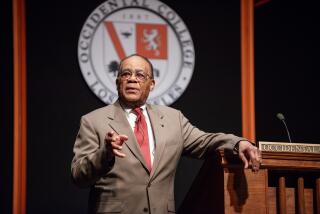Obituaries : James Killian; Educator, Adviser to Two Presidents
- Share via
James R. Killian Jr., scientist, university president and White House adviser who went on to become a founding father of public television, died Friday night in Cambridge, Mass. He was 83.
Recipient of 39 honorary degrees, Killian was a president of the Massachusetts Institute of Technology from 1950 to 1959, and served as the first White House science adviser under President Dwight D. Eisenhower, later helping to oversee the development of intercontinental ballistic missiles. In 1961, after the Cuba Bay of Pigs incident, President John F. Kennedy appointed him to head a panel to review U.S. intelligence operations. In 1973, he was named chairman of the board of the Corporation for Public Broadcasting.
Killian, son of a textile maker, was born in Blacksburg, S.C., on July 24, 1904. He studied at Trinity College, now Duke University, for two years, then transferred to MIT, where he received a Bachelor of Science in business and engineering administration in 1926.
He then worked at Technology Review, MIT’s national magazine on science and technology policy, serving as editor from 1930-1939.
School Prospered
As president of MIT from 1949 to 1959, he advocated innovation and curriculum reform, especially in high schools, and broadening and strengthening engineering education along with basic research. The school prospered in size and reputation during his tenure as president and later as chairman of the MIT Corp. until 1971.
In 1950, predicting scientific developments during the next half century, he said he expected the development of “flicker-free color television, probably three-dimensional;” air travel at speeds up to 1,000 m.p.h. or more; synthetic foods; better ways of preserving foods; increased use of solar energy to heat homes and efficient conversion of sea water into fresh water.
On leave from MIT from 1957 to 1959, he served as Special Assistant for Science and Technology to Eisenhower and chaired the President’s Science Advisory Committee.
In 1954, Eisenhower asked him to head a task force of scientists, engineers and military officers on advancing U.S. military technology, especially its missile program. The panel made the recommendations, critical to the national strategy of nuclear deterrence, to develop the Polaris guided missile submarine, which provided for a survivable nuclear force in the event of a first-strike attack. The task force also recommended building the U-2 spy plane.
CIA Reorganization
In 1961, after the Central Intelligence Agency’s failure in the Bay of Pigs attempt to topple Cuba’s Fidel Castro, Kennedy named him to head a review panel whose secret recommendations for reorganizing intelligence operations were followed by an expansion of covert activities.
In 1965, Killian chaired the Carnegie Commission on Educational Television, whose recommendations led Congress to pass the Public Television Act of 1967. He was a member of the board of the Corporation for Public Broadcasting from 1968-1975 and chairman from 1973-1974.
He served from 1969-1974 on the General Advisory Committee of the U.S. Arms Control and Disarmament Agency.
In 1929, he married Elizabeth Parks, who died in 1986. He is survived by a daughter, Carolyn Staley; a son, R. Meredith Killian; a sister, Ruth Nicholls, and six grandchildren.
An MIT spokesman said funeral services will be private. A memorial service for the university community will be announced later.
More to Read
Sign up for Essential California
The most important California stories and recommendations in your inbox every morning.
You may occasionally receive promotional content from the Los Angeles Times.











